11 Important Health Benefits Of Spinach + Nutrition Facts
Boost your body and mind with this vibrant and nutritious leafy green.
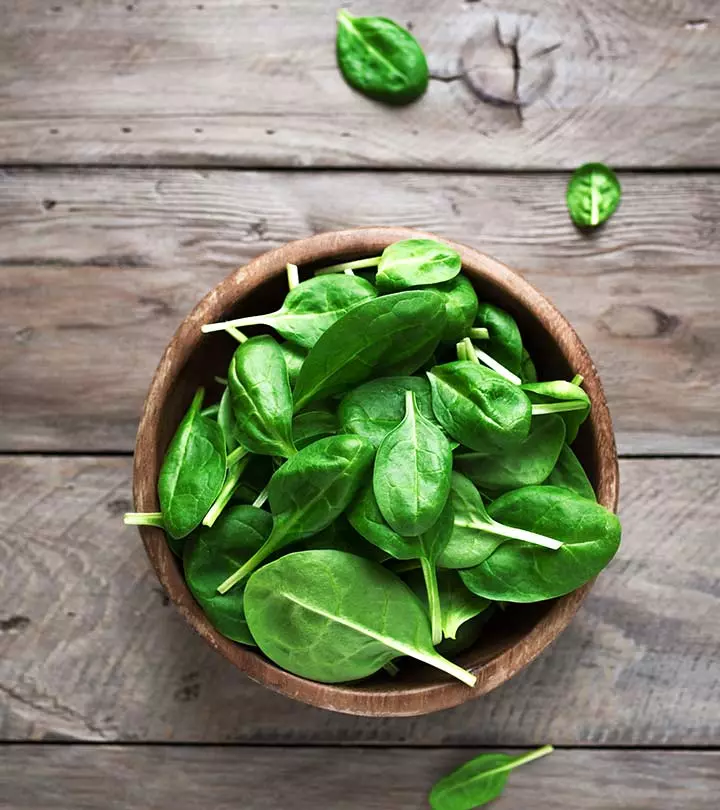
Image: Shutterstock
The benefits of spinach are mainly due to its rich plant chemical content and may help improve skin and hair health and assist in cancer treatment (1). This leafy green is a staple across many diets worldwide and is loaded with vitamins, minerals, and antioxidants.
This article explores how spinach benefits your health, its nutritional profile, its potential side effects, and how to include it in the diet. Read on!
 Know Your Ingredient: Spinach
Know Your Ingredient: SpinachWhat Is It?
Nutritious leafy, green vegetables used in a wide range of dishes worldwide.
What Are Its Benefits?
It may aid in weight loss, reduce cancer risk, treat diabetes and hypertension, boost vision health, and enhances skin, hair, and nail health.
Who Can Consume It?
It is safe for all except those who are on blood thinning medication.
How Often?
You can consume it daily in moderation.
Caution
Excess consumption may aggravate kidney stones.
In This Article
Types Of Spinach
Here are some of the most common types of spinach:
- Savoy Spinach: It is easily available in the market and commonly used for cooking. It is dark green, with a crinkled texture and a bitter taste.
- Flat-Leaf Spinach: It has flat, smooth, tender, and bright green leaves and is usually used in fresh salads.
- Baby Spinach: This is the flat-leaf variety that is harvested early for its sweeter and more tender texture.
- Red Spinach: This variety has a reddish or purplish shade with deep red veins.
- Emperor Spinach: It is a semi-savoy type, warm-weather spinach with thick and fleshy leaves that usually grows in Asian countries and is also called Malabar or Indian spinach.

Keep reading to learn about the nutritional value of spinach to understand how it contributes to better health.
Key Takeaways
- Spinach contains vitamin A, which will protect you from UV rays.
- Include spinach in your diet to keep your blood sugar level in check.
- Spinach is great for your gut. It improves digestion since it is high in fiber content. It can also reduce your hunger pangs.
- Do not go overboard with the vegetable, as it has a high amount of oxalate, which can cause kidney stones.
What Is The Nutritional Profile Of Spinach?
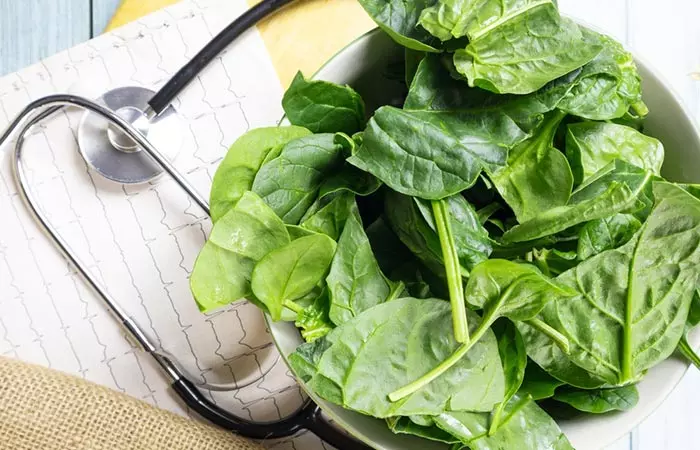
The most abundant nutrients in spinach include vitamins A, C, K1, and iron, folic acid, and calcium. It also contains powerful antioxidants, including lutein, zeaxanthin, and quercetin (all of these fight free radicals and reduce oxidative stress).
A hundred grams of spinach contains 23 calories. The amount of spinach also contains 3 grams of protein, 4 grams of carbs, and 2 grams of fiber. Other important nutrients include:
- 99 mg of calcium
- 3 mg of iron
- 79 mg of magnesium
- 49 mg of phosphorus
- 558 mg of potassium
- 28 mg of vitamin C
- 194 mcg of folate
- 9380 IU of vitamin A
- 12200 mcg of lutein and zeaxanthin
- 483 mcg of vitamin K
Source
: United States Department of Agriculture, National Nutrient Database, spinach, raw
The nutritional requirements of men and women vary slightly according to various global health organizations and research studies.
The following graph showcases the difference in the values of the recommended nutrient intake in men and women and how you can use spinach to fulfill these requirements. It also shows the presence of major macronutrients in 100g of boiled and drained spinach leaves.
Nutritional Graph Of Spinach
Source: Nutritional attributes of spinach, silver beet and eggplant Trivia
TriviaThese potent nutrients work in synergy to offer the various benefits of eating spinach. We will discuss them at length in the following section.
What Are The Health Benefits Of Spinach?

What is spinach good for? It is full of carotenoids that fight oxidative stress and cancer. The fiber content also promotes satiety and may help manage diabetes. Calcium promotes bone health, and lutein and zeaxanthin improve vision. Let’s have a look at spinach’s health benefits.
1. May Keep Your Skin, Hair, And Nails Healthy
The vitamin A in spinach can protect the skin from UV radiation.
It fights oxidative stress occurring on the dermal layers and promotes skin health. Consuming spinach regularly may give you healthy skin (2).
Spinach contains vitamin C. Several studies show that vitamin C can promote collagen synthesis (3). There may even be benefits to using spinach for hair growth as it is believed that the magnesium and iron in the vegetable may promote hair health. Iron deficiencies have been linked to hair loss (4). Spinach, being a rich source of iron, may help combat hair loss.
Spinach also contains biotin, a mineral that helps treat brittle nails (5).
2. May Help With Weight Loss
Some studies show that spinach may suppress hunger.
Overweight women showed a 43% greater loss in body weight after consuming 5 grams of a spinach extract for 3 months (6).
The women also showed a decreased urge to eat sweets by 95%. The spinach extract contained thylakoids, which are membranes usually found in green plants. These thylakoids help control fat digestion by interacting with fats and slowing their breakdown. This process releases hormones that make you feel full and reduce hunger. They also help increase the production of certain appetite-suppressing hormones after eating fatty meals (6).
3. May Reduce Cancer Risk
The glycoglycerolipids in spinach may have a role to play in cancer prevention.
They may achieve this by potentially inhibiting tumor growth (7).
As per some studies, vitamin A in spinach is linked to a reduced risk of breast cancer. Spinach intake (or carrots, which are also rich in vitamin A) for more than twice a week has been linked to a modest decrease in breast cancer risk (8).
Spinach is a cruciferous vegetable. Studies show that cruciferous veggies can play an important role in cancer prevention (9). These veggies are rich in carotenoids (like lutein and zeaxanthin) that may aid cancer treatment.
Cruciferous veggies also release indoles (upon preparation), which inactivate carcinogens and fight inflammation (9).
4. May Aid Diabetes Treatment
Spinach promotes satiety, thereby reducing postprandial (post-meal) glucose responses.
This was attributed to the high fiber and water content in the vegetable (10).
Spinach also contains nitrates. These compounds were found to help prevent insulin resistance. They can also relieve inflammation, a primary risk factor for diabetes. Spinach could be a promising ingredient to prevent insulin resistance (11).
Another reason spinach can be a part of an anti-diabetic diet is its low carb count. Compared to starchy veggies, spinach is a non-starchy vegetable with a low carb count (12). It may also lead to lower blood sugar levels.
Individuals with type 2 diabetes can include spinach in their diet as it helps in diabetes management. Its low-carb count may help regulate glucose levels, though this statement needs more research.
5. Helps Regulate Blood Pressure Levels
The nitrates in spinach deserve the credit. These compounds improve endothelial function and may acutely lower blood pressure levels, thereby promoting heart health (13).
Spinach nitrates may also relieve arterial stiffness, which can lead to high blood pressure levels (14).
Spinach leaf proteins may be useful in the treatment of hypertension. It may also reduce the risk of heart disease (15).
The magnesium in the vegetable also regulates blood pressure levels. This mineral relaxes and widens the blood vessels, thereby promoting blood flow (16).
 Did You Know?
Did You Know?6. May Boost Vision Health
Spinach contains two important antioxidants, lutein and zeaxanthin, which have been extensively studied for their vision-promoting effects. These compounds fight reactive oxygen speciesi A highly reactive substance that contains oxygen. It can harm DNA, RNA, and proteins and possibly lead to cell death. and cut the risk of cataracts and age-related macular degenerationi There are two main forms of age-related macular degeneration: dry and wet. Both cause loss of vision. (17).
In a study, regular intake of spinach increased macular pigment optical density (18).
7. May Lead To Strong Bones
Spinach may maximize bone health. It is rich in vitamin K and calcium, two nutrients important for bone strength (19).
Low calcium intake over a lifetime also leads to osteoporosis. It is linked to low bone mass, rapid bone loss, and high fracture rates. Spinach contains calcium and can help counter this (20).
8. May Promote Digestion
Spinach contains fiber (21). Though it is not a lot, the fiber can offer some benefits.
Research shows that fiber can keep you feeling full for longer. It also promotes regularity as it helps the food move through the digestive system (22).
9. May Help Treat Asthma
Oxidative stressi A disparity between antioxidants and free radicals in the body. It can result in cell and tissue damage. plays a role in asthma. Spinach contains vitamin C, a potent antioxidant that can combat oxidative stress. This may aid asthma treatment (23).
The lutein and zeaxanthin in the leafy green may also help treat asthma (23). Anecdotal evidence suggests that eating spinach may also keep one from developing asthma.
However, spinach (or other foods) may not be a definitive cure for asthma. More studies are needed to understand the effects of diet on asthma and other allergies (23).
10. May Promote Fetal Development
Spinach contains folic acid, a nutrient essential for fetal development. This nutrient reduces the risk of defects in the unborn child’s nervous system (24).
Some research also suggests that the iron in spinach may help prevent pre-term deliveries and low birth-weight babies. However, information is unclear, and we need more studies in this regard (25).
11. May Boost Brain Function
Spinach may have anti-stress and anti-depressive effects. These effects can be attributed to the ability of spinach to reduce blood levels of corticosterone (a hormone involved in stress responses) (26).
Other nutrients in spinach, namely vitamin K, folate, lutein, and beta-carotene (vitamin A), are also believed to promote brain health and slow down cognitive decline. More research is needed to establish a connection.
Spinach is indeed a superfood. Eating raw spinach as part of a salad can be a good idea. Here are other ways.
How To Include Spinach In Your Diet
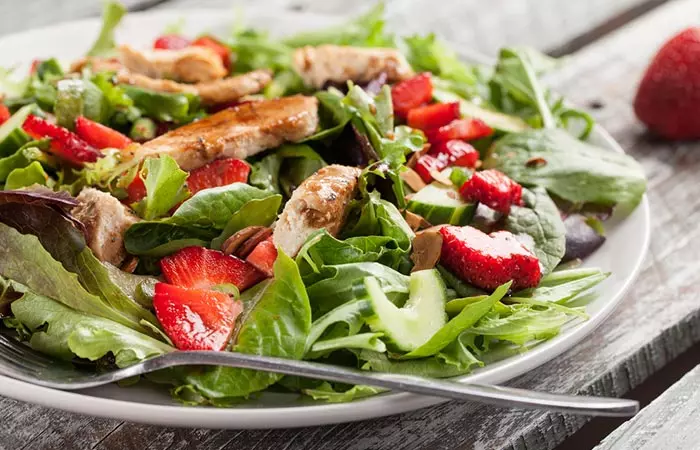
You are doing your body a lot of good if you are regularly eating spinach. Including the leafy green in your diet is easy. Keep reading to learn how to cook spinach or add it to your daily meals.
- You can make it a part of your hummus. Cooked spinach tastes great!
- Make spinach the primary ingredient in your cupcakes.
- Add spinach to your morning smoothie. You can also grind spinach leaves and prepare a green smoothie/spinach juice.
- Spinach can also be added to curries. Blanching spinach and adding it to your dishes also works.
- Spinach can be part of your vegetable salad. Drizzling some olive oil over the salad makes it much healthier.
 Trivia
TriviaA blogger and fitness trainer shared how they incorporated spinach leaves in their diet. According to them, adding spinach leaves in protein shakes greatly enhances them, stating, “Adding spinach to your protein shake or smoothie won’t change the taste (you won’t taste it at all), but it will improve the nutritional content…. I add fresh, baby spinach to my chocolate-peanut butter protein shakes, and my fruit and Greek yogurt protein smoothies (i).”
How To Select And Store Spinach Leaves

Picking locally grown spinach works best. Also, look for the best-before date. You should pick fresh spinach. Keep these points in mind:
- Go for bright green leaves. Avoid leaves that are brown or yellow or wilted.
- Choosing spinach stored in a cooler is better (than that stored on a shelf).
- Remember to keep spinach in the original bag or container and wash only prior to use. Store the remaining spinach in the same bag in the refrigerator, ensuring there is no moisture.
- Wrapping the bag in a clean towel can offer extra protection.
Though spinach is a powerhouse of nutrients, it comes with certain warnings.
What Are The Possible Side Effects Of Spinach?
Spinach is replete with the essential nutrients. Most of the research has confirmed its health benefits. However, taking excess spinach could cause side effects.
- May Aggravate Kidney Stones
This is the most common concern with spinach. Spinach contains large amounts of oxalates (just like beets and rhubarb). These may bind with calcium in the urinary tract and can lead to calcium oxalate stones (27). Hence, individuals with kidney disease/stones must stay away from spinach. - May Interfere With Blood-Thinning Medications
The vitamin K in spinach plays a role in forming blood clots. Hence, you must be wary of your vitamin K intake if you are on blood thinners. Spinach, being high in vitamin K, may interfere with medications that help in blood-thinning (including Warfarin) (28). You may need to reduce your consumption of spinach if you are on Warfarin.
Infographic: Benefits Of Spinach
Green leafy vegetables are an indivisible part of a healthy diet. Spinach is one such green veggie that is loaded with many beneficial nutrients. When included as a part of the diet, spinach offers an array of health benefits.
Learn about the major benefits of spinach and ways to include it in your diet from the infographic below.
Some thing wrong with infographic shortcode. please verify shortcode syntax
Spinach is one of the healthiest green leafy vegetables packed with iron and beneficial phytonutrients. The benefits of spinach are attributed to its rich antioxidant profile and an array of vitamins and minerals. It may help manage diabetes and weight loss. It also may promote the immune system, gut, vision, brain, heart, and bone health. It is good for your hair and skin too. However, excess consumption may interfere with blood-thinning medications or aggravate kidney stones in some individuals. Hence, limit its consumption and seek medical advice if you experience any side effects.
Frequently Asked Questions
Can spinach be consumed daily?
Yes, spinach can be consumed daily. Just make sure to eat it as part of a balanced diet to get all the benefits. Also, consult your doctor before consuming it if you have kidney stones or taking any medications.
How much spinach can you eat in a day?
The ideal dosing of spinach depends on the individual and their health condition. As per anecdotal evidence, one or two cups of spinach (about 60 grams) a day could be a good idea.
Is spinach a keto?
Yes. Spinach is high in nutrients and low in carbs. Hence, it can be added to a keto diet.
Should you eat spinach raw or cooked?
Raw spinach may have a slightly higher amount of nutrients, though the difference is not a lot. But raw spinach may cause gas. It boils down to your preference and experience.
Is spinach good for weight loss?
Spinach is low in calories and high in fiber. Though it may not directly aid weight loss, it can be part of a weight loss diet.
How is regular spinach different from baby spinach?
Baby spinach is typically harvested in the early stages of plant growth. The leaves are smaller, and the texture is more tender. Regular spinach has large leaves.
What is the best time to eat spinach?
You can eat spinach all through the day. Its high nutritional value, energy outcome, and low calorie content make it a good vegetable to have on a daily basis.
Is spinach good for blood circulation?
Since spinach is a nitrate-rich food, it may help improve the flexibility of arteries and boost circulation (29).
Does spinach lower cholesterol?
Spinach contains lutein, an antioxidant that may help lower cholesterol. Thus, consuming spinach may help reduce the risk of high fat and cholesterol diet-induced oxidative stress (30).
Illustration: Important Health Benefits Of Spinach + Nutrition Facts
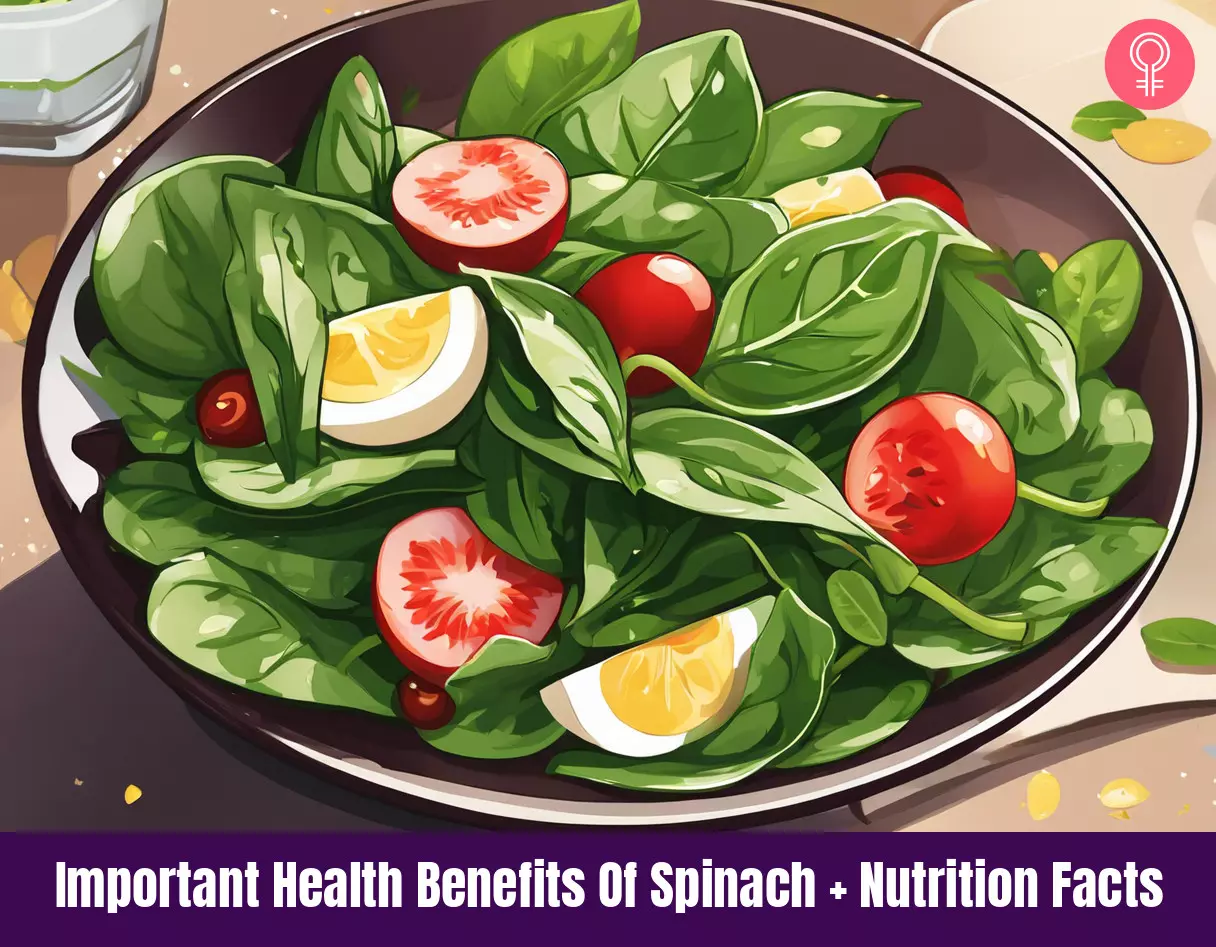
Image: Stable Diffusion/StyleCraze Design Team
Take a look at this video explaining the amazing benefits of spinach and cautions to watch out for. Also, learn how to get the most out of this superfood and stay healthy. Go, check it out!
Personal Experience: Source
StyleCraze's articles are interwoven with authentic personal narratives that provide depth and resonance to our content. Below are the sources of the personal accounts referenced in this article.
(i) Add Spinach to your Protein Shakehttps://athleticperformancetc.wordpress.com/2016/08/29/add-spinach-to-your-protein-shake/
References
Articles on StyleCraze are backed by verified information from peer-reviewed and academic research papers, reputed organizations, research institutions, and medical associations to ensure accuracy and relevance. Read our editorial policy to learn more.
- Functional properties of spinach (Spinacia oleracea L.) phytochemicals and bioactives, Food & Function, US National Library of Medicine, National Institutes of Health.
https://pubmed.ncbi.nlm.nih.gov/27353735/ - The Role of Phytonutrients in Skin Health, Nutrients, US National Library of Medicine, National Institutes of Health.
https://www.ncbi.nlm.nih.gov/pmc/articles/PMC3257702/ - Effect of vitamin C and its derivatives on collagen synthesis and cross-linking by normal human fibroblasts, International Journal of Cosmetic Science, US National Library of Medicine, National Institutes of Health.
https://pubmed.ncbi.nlm.nih.gov/18505499/ - Iron plays a certain role in patterned hair loss, Journal of Korean Medical Science, US National Library of Medicine, National Institutes of Health.
https://pubmed.ncbi.nlm.nih.gov/23772161/ - Biotin, National Institutes of Health, Office of Dietary Supplements.
https://ods.od.nih.gov/factsheets/Biotin-HealthProfessional/ - Acute Effects of a Spinach Extract Rich in Thylakoids on Satiety: A Randomized Controlled Crossover Trial, Journal of the American College of Nutrition, US National Library of Medicine, National Institutes of Health.
https://www.ncbi.nlm.nih.gov/pmc/articles/PMC4600649/ - Anti-cancer effect of spinach glycoglycerolipids as angiogenesis inhibitors based on the selective inhibition of DNA polymerase activity, Mini Reviews in Medicinal Chemistry, US National Library of Medicine, National Institutes of Health.
https://pubmed.ncbi.nlm.nih.gov/21034405/ - Intake of carrots, spinach, and supplements containing vitamin A in relation to risk of breast cancer, Cancer epidemiology, Biomarkers & Prevention, US National Library of Medicine, National Institutes of Health.
https://pubmed.ncbi.nlm.nih.gov/9367061/ - Cruciferous vegetables and cancer prevention. Nutrition and Cancer, US National Library of Medicine, National Institutes of Health.
https://pubmed.ncbi.nlm.nih.gov/12094621/ - Satiety effects of spinach in mixed meals: comparison with other vegetables, International Journal of Food Sciences and Nutrition, US National Library of Medicine, National Institutes of Health.
https://pubmed.ncbi.nlm.nih.gov/8574859/ - Effects of spinach nitrate on insulin resistance, endothelial dysfunction markers and inflammation in mice with high-fat and high-fructose consumption, Food & Nutrition Research, US National Library of Medicine, National Institutes of Health.
https://www.ncbi.nlm.nih.gov/pmc/articles/PMC5018658/ - Diabetes and Carbs, Centers for Disease Control and Prevention.
https://www.cdc.gov/diabetes/healthy-eating/fiber-helps-diabetes.html - Flavonoid-rich apples and nitrate-rich spinach augment nitric oxide status and improve endothelial function in healthy men and women: a randomized controlled trial, Free Radical Biology & Medicine, US National Library of Medicine, National Institutes of Health.
https://pubmed.ncbi.nlm.nih.gov/22019438/ - Effect of Spinach, a High Dietary Nitrate Source, on Arterial Stiffness and Related Hemodynamic Measures: A Randomized, Controlled Trial in Healthy Adults, US National Library of Medicine, National Institutes of Health.
https://pubmed.ncbi.nlm.nih.gov/26251834/ - Antihypertensive properties of spinach leaf protein digests, Journal of Agricultural and Food Chemistry, US National Library of Medicine, National Institutes of Health.
https://pubmed.ncbi.nlm.nih.gov/15080624/ - Magnesium in Disease Prevention and Overall Health, Advances in Nutrition, Oxford Academic Journals.
https://academic.oup.com/advances/article/4/3/378S/4591618 - Dietary Sources of Lutein and Zeaxanthin Carotenoids and Their Role in Eye Health, Nutrients, US National Library of Medicine, National Institutes of Health.
https://www.ncbi.nlm.nih.gov/pmc/articles/PMC3705341/ - Effects of Constant Intake of Lutein-rich Spinach on Macular Pigment Optical Density: a Pilot Study, Nippon Ganka Gakkai zasshi, US National Library of Medicine, National Institutes of Health.
https://pubmed.ncbi.nlm.nih.gov/26950968/ - Essential Nutrients for Bone Health and a Review of their Availability in the Average North American Diet, The Open Orthopaedics Journal, US National Library of Medicine, National Institutes of Health.
https://www.ncbi.nlm.nih.gov/pmc/articles/PMC3330619/ - Osteoporosis Overview, Osteoporosis and Related Bone Diseases National Resource Center, National Institutes of Health.
https://www.niams.nih.gov/health-topics/bone-health-and-osteoporosis - Spinach, raw, U.S. Department of Agriculture.
https://fdc.nal.usda.gov/fdc-app.html#/food-details/168462/nutrients - Health benefits of dietary fiber, Nutrition Reviews, CiteSeerX, The Pennsylvania State University.
https://citeseerx.ist.psu.edu/viewdoc/download?doi=10.1.1.525.9095&rep=rep1&type=pdf - Dietary Factors and the Development of Asthma, Immunology and Allergy Clinics of North America, US National Library of Medicine, National Institutes of Health.
https://www.ncbi.nlm.nih.gov/pmc/articles/PMC2536613/ - The use of folic acid for the prevention of neural tube defects and other congenital anomalies, Journal of Obstetrics and Gynaecology Canada, US National Library of Medicine, National Institutes of Health.
https://pubmed.ncbi.nlm.nih.gov/14608448/ - Iron Nutriture of the Fetus, Neonate, Infant, and Child, Annals of Nutrition & Metabolism, US National Library of Medicine, National Institutes of Health.
https://www.ncbi.nlm.nih.gov/pmc/articles/PMC6143763/ - Anti-Stress and Anti-Depressive Effects of Spinach Extracts on a Chronic Stress-Induced Depression Mouse Model through Lowering Blood Corticosterone and Increasing Brain Glutamate and Glutamine Levels, Journal of Clinical Medicine, US National Library of Medicine, National Institutes of Health.
https://pubmed.ncbi.nlm.nih.gov/30384468/ - Nutritional Management of Kidney Stones (Nephrolithiasis), Clinical Nutrition Research, US National Library of Medicine, National Institutes of Health.
https://www.ncbi.nlm.nih.gov/pmc/articles/PMC4525130/ - Knowledge of Coumadin Use and Vitamin K Interaction in Atrial Fibrillation Patients, Utah State University.
https://digitalcommons.usu.edu/cgi/viewcontent.cgi?article=1007&context=honors - Effects of a nitrate-rich meal on arterial stiffness and blood pressure in healthy volunteers, Nitric Oxide, US National Library of Medicine, National Institutes of Health.
https://pubmed.ncbi.nlm.nih.gov/24120618/ - Antioxidant Effects of Spinach (Spinacia oleracea L.) Supplementation in Hyperlipidemic Rats, Preventive Nutrition and Food Science, US National Library of Medicine, National Institutes of Health.
https://pubmed.ncbi.nlm.nih.gov/24772405/
Read full bio of Alexandra Dusenberry
Read full bio of Ravi Teja Tadimalla
Read full bio of Arshiya Syeda
Read full bio of Sindhu Koganti










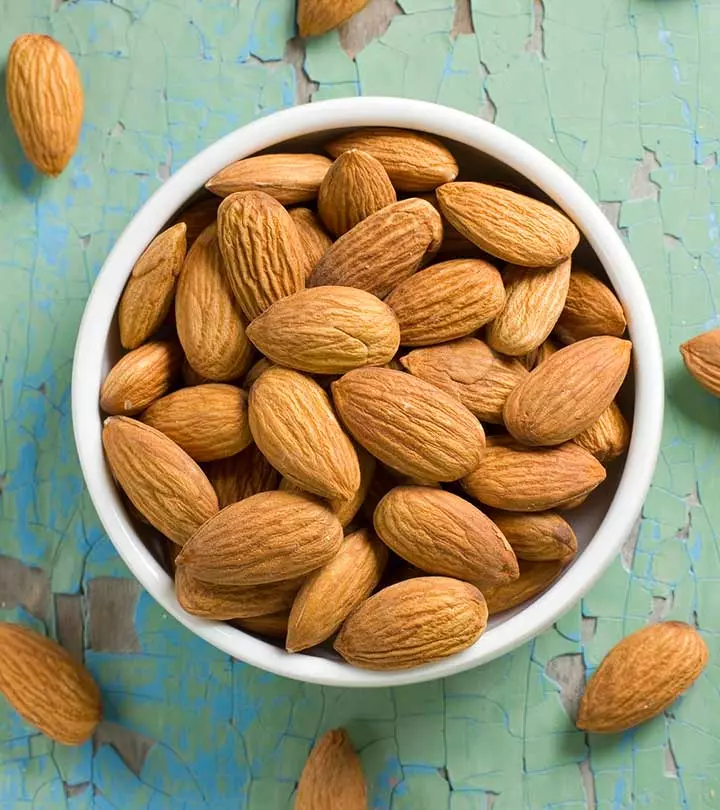
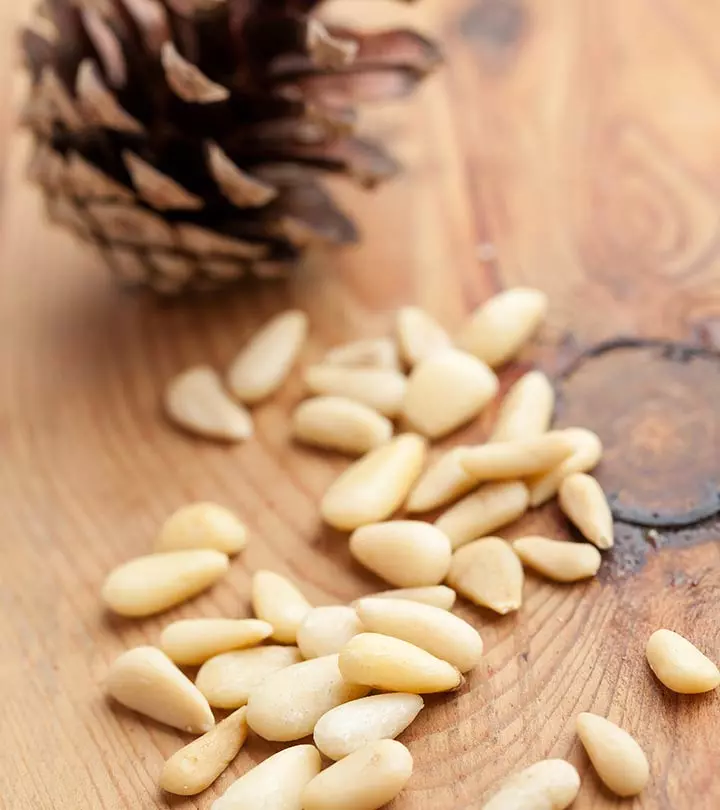


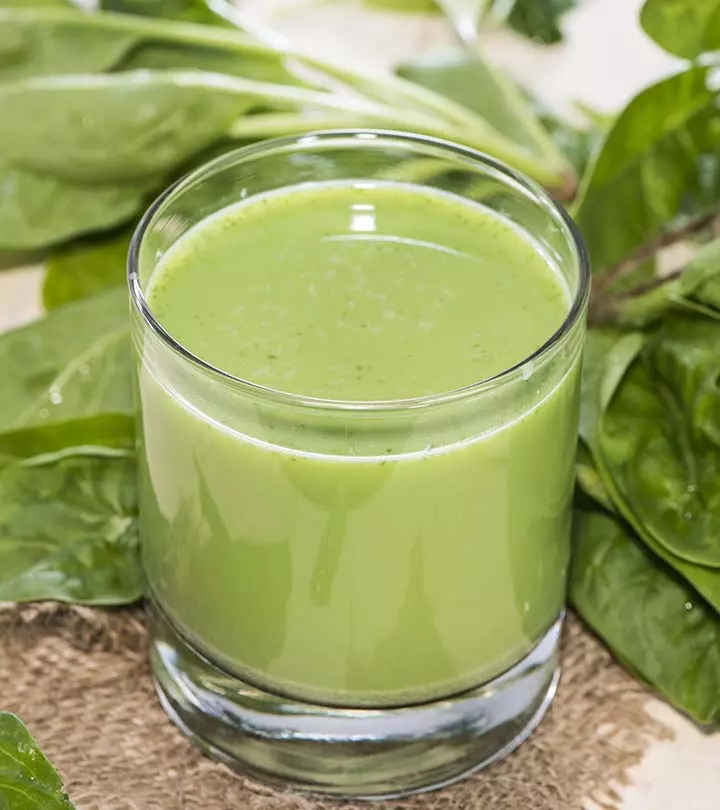



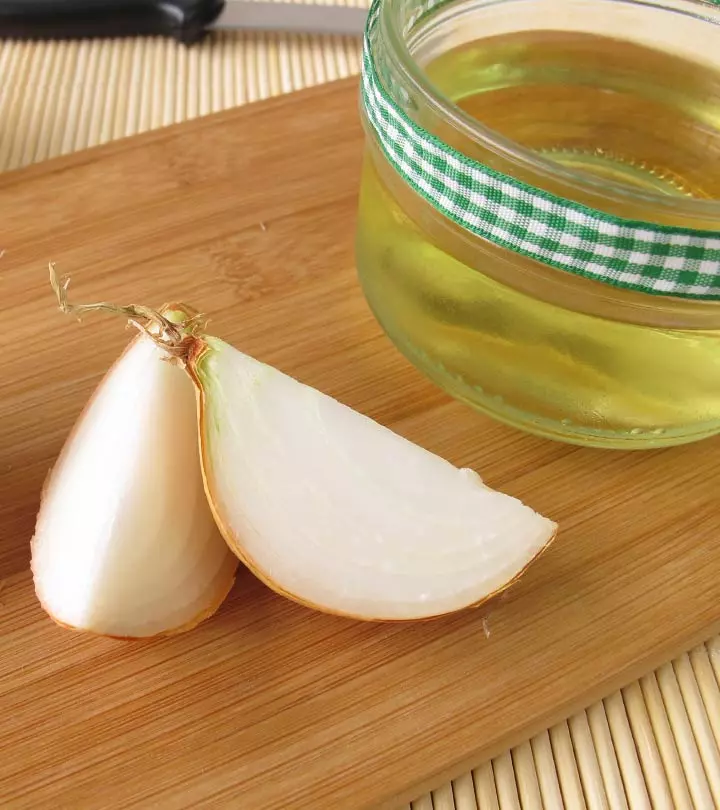









Community Experiences
Join the conversation and become a part of our empowering community! Share your stories, experiences, and insights to connect with other beauty, lifestyle, and health enthusiasts.